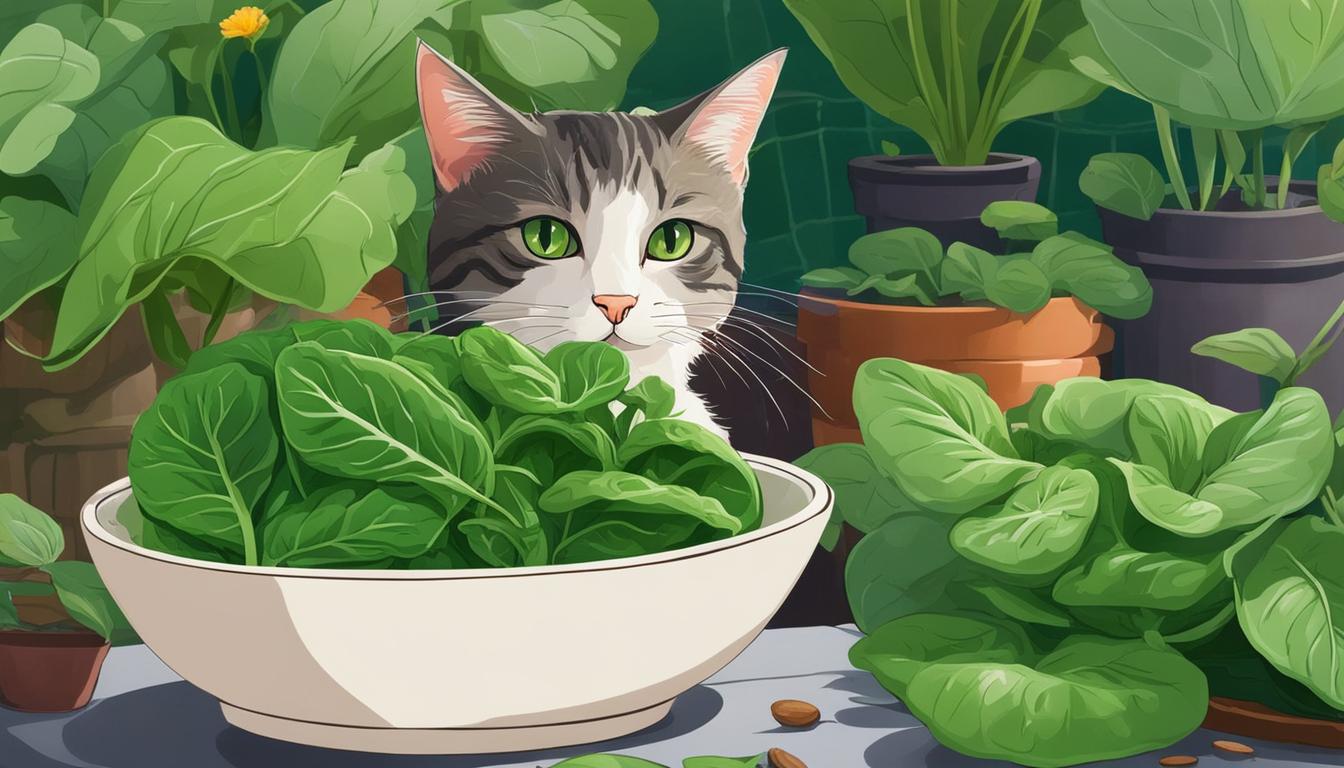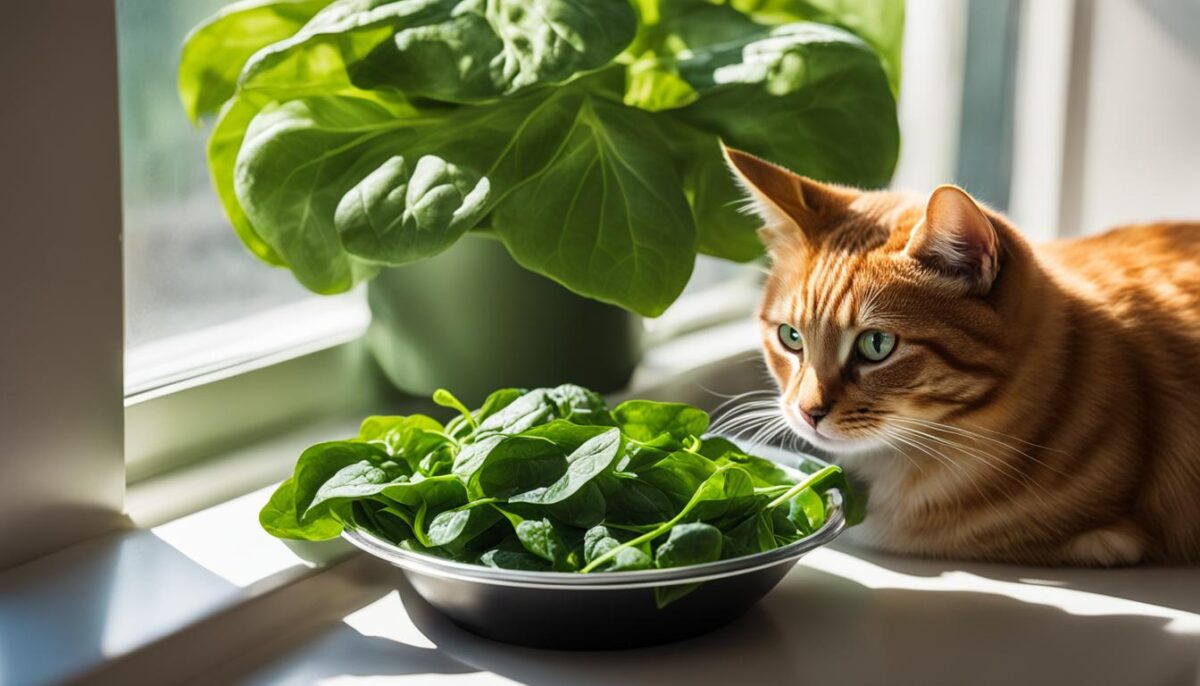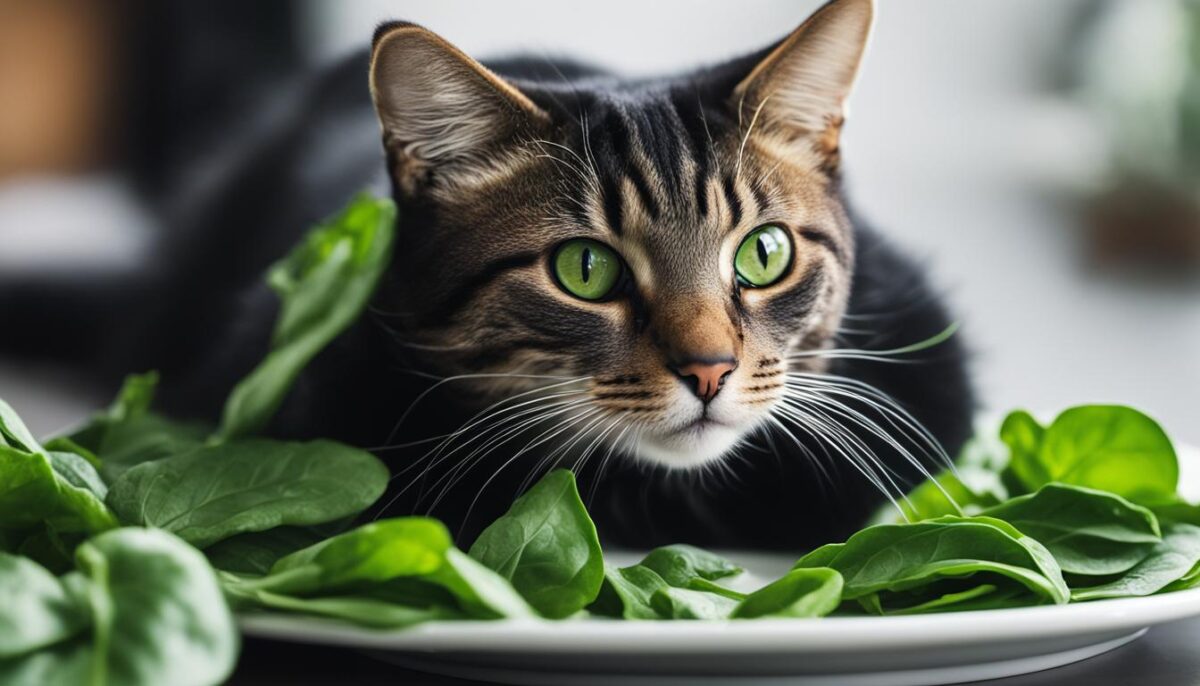Are you curious about whether cats can eat spinach? The good news is that, yes, cats can safely consume spinach. However, it’s important to understand the benefits and risks associated with incorporating spinach into your cat’s diet. Read on to learn more about the safety, nutritional value, and guidelines for feeding spinach to your feline friend.
Key Takeaways:
- Spinach is safe for cats in moderation, but it should not be a staple in their diet.
- Spinach contains essential vitamins and minerals that can contribute to a cat’s overall health.
- Cats with kidney or urinary problems should avoid consuming too much spinach due to its calcium oxalate content.
- It’s best to consult with a veterinarian before introducing spinach or any new food to your cat’s diet.
- Other cat-friendly vegetables, such as carrots and peas, can also provide nutritional benefits.
Nutritional Value of Spinach for Cats
Spinach is a cat-friendly vegetable that offers several nutritional benefits. It is a leafy green that contains vitamins A, K, B6, B2, and E. These vitamins are essential for maintaining a cat’s overall health and immune function. Spinach also provides important minerals such as magnesium, folate, calcium, and potassium, which contribute to a well-rounded diet for cats.
While spinach can be a nutritious addition to a cat’s diet, it’s important to note that cats do not require vegetables like humans do. Cats are obligate carnivores, which means their bodies are designed to primarily digest and utilize animal-based protein. As long as cats are consuming a balanced, high-quality cat food that meets their nutritional needs, they can obtain all the necessary vitamins and minerals without the need for additional vegetables like spinach.
However, if you choose to offer spinach to your cat as an occasional treat, it’s crucial to prepare it properly. Steam the spinach and avoid adding any salt, spices, or seasonings. Cats have a limited sense of taste for sweetness, so it’s best to serve plain cooked spinach without any added ingredients. Remember to introduce new foods gradually and observe your cat’s preferences and reactions.
Ultimately, while spinach can provide nutritional benefits to cats, it should not replace their main source of nutrition. If you have any concerns or questions about incorporating spinach or any other vegetables into your cat’s diet, it’s always best to consult with your veterinarian to ensure that it aligns with your cat’s specific dietary needs.
Feeding Spinach to Your Cat
Feeding spinach to your cat can be a healthy addition to their diet, but it’s important to do it properly. Here are some tips on how to feed spinach to your feline friend:
1. Steam the Spinach
Before offering spinach to your cat, it’s best to steam it to make it easier for them to digest. Steaming also helps to soften the leaves, making it more appealing for your cat. Avoid adding any salt, spices, or seasoning to the spinach as these may be harmful to your furry companion.
2. Offer as a Snack
Cats are obligate carnivores, which means that their bodies are designed to primarily digest meat. While spinach can provide some nutritional benefits, it should be offered as a small snack rather than a main meal. Cats may not be naturally inclined to eat vegetables, so observe their preference and offer a small amount of cooked, plain spinach as an occasional treat.
Tip: Follow the rule of 10% when giving treats to cats. Treats should make up no more than 10% of their daily calorie intake.
3. Consult with Your Vet
Before introducing spinach or any other new food into your cat’s diet, it’s always a good idea to consult with your veterinarian. They can provide guidance on the appropriate amount and frequency of feeding spinach to your cat based on their specific dietary needs.
| Benefits of Feeding Spinach to Cats | Risks of Feeding Spinach to Cats |
|---|---|
|
|
Other Cat-Friendly Vegetables
If you’re looking to add some variety to your cat’s diet, there are other vegetables that can be included in moderation. These cat-friendly vegetables provide additional vitamins and fiber that contribute to a well-rounded diet for your feline friend. Here are a few options:
- Carrots: Carrots are a great source of beta-carotene, which can be converted into vitamin A. They also provide fiber and a satisfying crunch that cats may enjoy as a snack.
- Peas: Peas are another vegetable that cats can safely consume. They are rich in vitamins A, B, and K, as well as minerals like potassium and magnesium.
- Pumpkin: Pumpkin is often recommended as a natural remedy for digestive issues in cats. It is high in fiber and can help regulate bowel movements. Just make sure to use plain, cooked pumpkin without any added sugars or spices.
When introducing new vegetables to your cat’s diet, it’s important to do so gradually. Start with small amounts and monitor your cat’s reaction. Some cats may enjoy these vegetables and incorporate them into their regular meals, while others may simply view them as occasional treats. It’s all about finding what works best for your individual cat.
Remember to consult with your veterinarian before making any significant changes to your cat’s diet. They can provide tailored guidance based on your cat’s specific nutritional needs and any underlying health conditions.
| Vegetable | Nutritional Benefits | Preparation Tips |
|---|---|---|
| Carrots | Rich in beta-carotene and fiber | Steam or lightly cook and offer as a small snack |
| Peas | Provide vitamins A, B, and K, as well as potassium and magnesium | Cooked and mashed peas can be added to your cat’s regular food |
| Pumpkin | High in fiber and aids in digestion | Offer plain, cooked pumpkin in small amounts as a treat |
Adding variety to your cat’s diet can help ensure they are getting a wide range of nutrients. However, it’s important to remember that a cat’s primary source of nutrition should always be a high-quality cat food that meets their specific dietary needs. Vegetables should only be given as occasional supplements or treats.
Cat-Friendly Vegetables in Commercial Cat Food Options
If you’re looking to incorporate spinach into your cat’s diet but aren’t sure how to do so, commercial cat food options can be a convenient and reliable choice. Many cat food brands offer formulas that include spinach as an ingredient, providing a controlled amount of this leafy green to support your cat’s nutrition.
When selecting a commercial cat food with spinach, it’s important to read the ingredient list and ensure that it meets your cat’s specific dietary needs. Look for high-quality cat foods that contain real meat as the primary ingredient, as this is essential for fulfilling a cat’s protein requirements. Additionally, check for any allergens or ingredients that your cat may be sensitive to.
While spinach can be a valuable addition to a cat’s diet, it should not replace their regular cat food. Remember to maintain a balanced diet for your cat, ensuring they receive a variety of proteins, fats, and nutrients from their main cat food. Consulting with a veterinarian can help you determine the best commercial cat food options with spinach that align with your cat’s specific needs and dietary requirements.
Cat Food Brands with Spinach
| Brand | Product | Ingredients |
|---|---|---|
| Brand A | Spinach Sensation | Chicken, spinach, potatoes, vitamins, minerals |
| Brand B | Spinach Delight | Turkey, spinach, brown rice, peas, omega fatty acids |
| Brand C | Super Spinach Feast | Salmon, spinach, sweet potatoes, cranberries, taurine |
Table: Cat food brands with spinach as an ingredient.
These cat food options with spinach offer a convenient way to provide the benefits of this leafy green in a controlled and balanced manner. Remember to introduce the food gradually into your cat’s diet and monitor their reaction. If you notice any digestive issues or adverse reactions, consult with your veterinarian for further guidance and adjustments to your cat’s diet.
Balancing Cat’s Diet with Spinach and Other Foods
While spinach can provide some benefits to cats, it should not replace their main cat food. It’s essential to maintain a balanced diet for cats that includes a variety of proteins, fats, and nutrients. If you choose to incorporate spinach or other vegetables into your cat’s diet, consult with a veterinarian to ensure that it aligns with their specific nutritional requirements.
When it comes to cat-friendly vegetables, spinach is just one option. There are other leafy greens that can be included in a cat’s diet in moderation. Carrots, peas, and pumpkin are also good choices that provide additional vitamins and fiber for a well-rounded diet. It’s important to introduce new foods gradually and observe your cat’s reaction to ensure they tolerate it well.
While cats are obligate carnivores, meaning they require a diet primarily consisting of meat, some cats may enjoy the taste and texture of vegetables. Offering a small amount of cooked, plain spinach as a treat can provide variety in their diet. Remember to follow the rule of 10% when giving treats to cats, ensuring that treats make up no more than 10% of their daily calorie intake.
| Cat-Friendly Vegetables | Benefits |
|---|---|
| Spinach | Contains vitamins A, K, B6, B2, and E, as well as minerals like magnesium, folate, calcium, and potassium. |
| Carrots | Rich in beta-carotene, which can improve eye health and provide additional antioxidants. |
| Peas | High in fiber and a good source of essential vitamins like A, C, and K. They also provide protein and can aid digestion. |
| Pumpkin | Can help with digestive issues and provide additional fiber. It also contains vitamins A, C, and E. |
When choosing commercial cat foods, some options include spinach as an ingredient. These foods are specifically formulated to provide balanced nutrition for cats and may offer the benefits of spinach in a controlled amount. It’s important to read the ingredient list and ensure that the cat food meets your cat’s specific dietary needs.
Remember, it’s always best to consult with a veterinarian before making any significant changes to your cat’s diet. They can provide guidance on incorporating spinach or other vegetables into your cat’s meals and ensure that their nutritional needs are being met. By offering a balanced diet with a variety of proteins, fats, and nutrients, you can help keep your cat healthy and happy.
Conclusion
In conclusion, the answer to the question “Can cats eat spinach?” is yes, but with caution. While spinach can provide some benefits to cats, it is not necessary for their diet. It is essential to understand the safety and potential risks of feeding spinach to cats.
Spinach contains beneficial vitamins and minerals, such as vitamins A, K, B6, and E, as well as calcium, magnesium, and potassium. These nutrients can contribute to a cat’s overall health and immune function. However, it is important to note that cats do not require spinach as long as they are consuming a high-quality cat food that meets their nutritional needs.
Feeding spinach to your cat should be done in small amounts and as a treat rather than a staple food. Cats with kidney or urinary problems should avoid spinach due to its calcium oxalate content. Before introducing spinach or any new food into your cat’s diet, it is always best to consult with a veterinarian to ensure their safety and well-being.
In addition to spinach, there are other cat-friendly vegetables that can be included in a cat’s diet, such as carrots, peas, and pumpkin. These vegetables provide additional vitamins and fiber that contribute to a well-rounded diet for cats. As with any new food, it is important to introduce them gradually and monitor your cat’s reaction.
Remember, your cat’s diet should be balanced and consist of a variety of proteins, fats, and nutrients. While spinach can offer some benefits, it should not replace their main cat food. Always prioritize your cat’s health and well-being by consulting with a veterinarian before making any changes to their diet.
FAQ
Can cats eat spinach?
Yes, cats can eat spinach, but it should not be a staple in their diet.
Is spinach safe for cats?
Spinach is safe for cats to eat, but it can pose risks to cats with kidney or urinary problems.
What are the benefits of spinach for cats?
Spinach contains vitamins and minerals that contribute to a cat’s overall health and immune function.
Are there risks of feeding spinach to cats?
Yes, spinach can pose risks to cats with certain health conditions due to its calcium oxalate content.
How should I feed spinach to my cat?
It is best to steam spinach and avoid adding any salt, spices, or seasoning. Offer a small amount as a snack.
Can spinach replace my cat’s main cat food?
No, spinach should not replace your cat’s main cat food. It should be offered as a treat in moderation.
What other vegetables are cat-friendly?
Carrots, peas, and pumpkin can be included in a cat’s diet in moderation.
Are there commercial cat foods with spinach?
Yes, some commercial cat foods include spinach as an ingredient, but read the ingredient list carefully.
How can I balance my cat’s diet with spinach and other foods?
It’s important to consult with a veterinarian to ensure a balanced diet that meets your cat’s specific needs.


